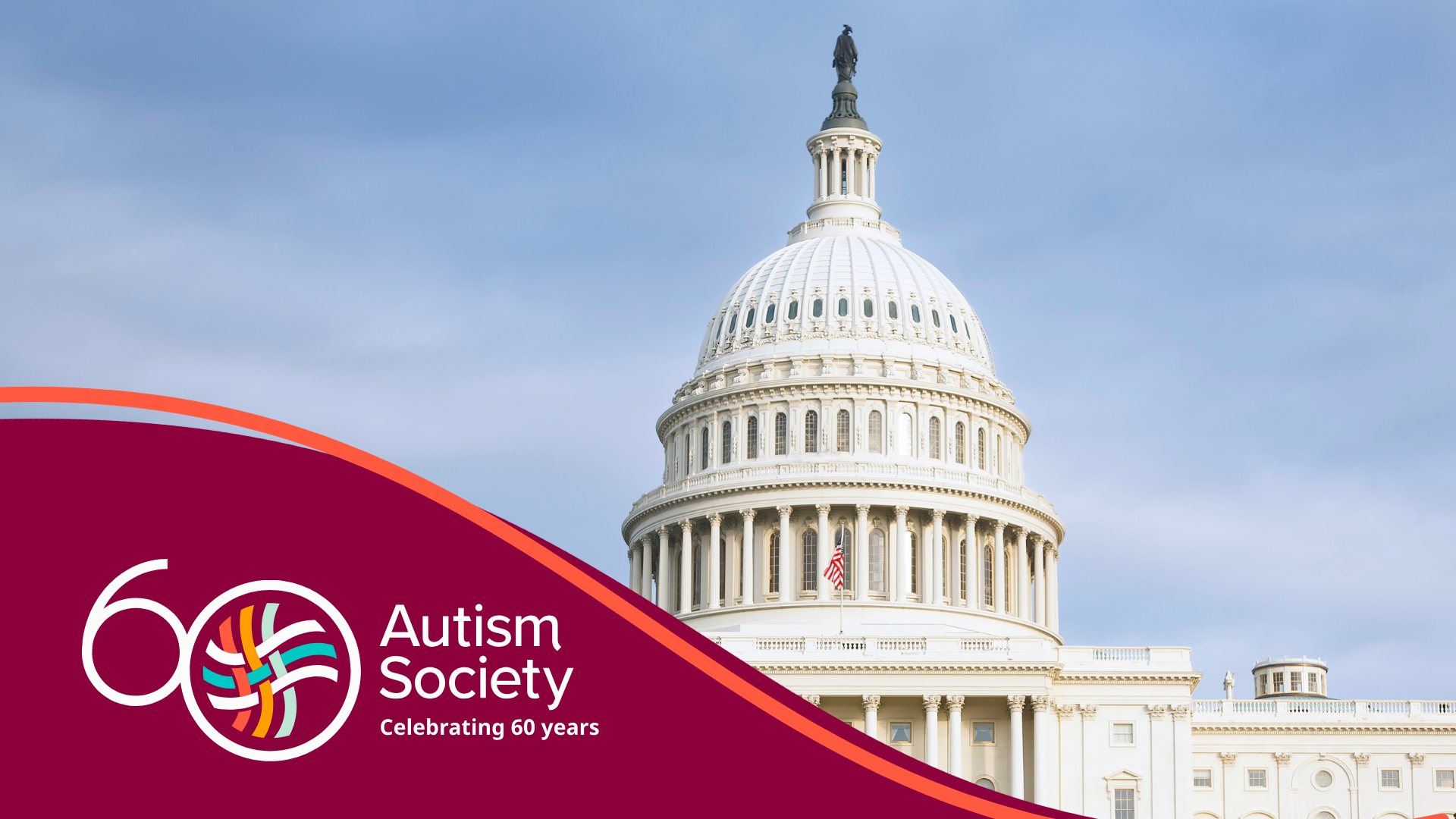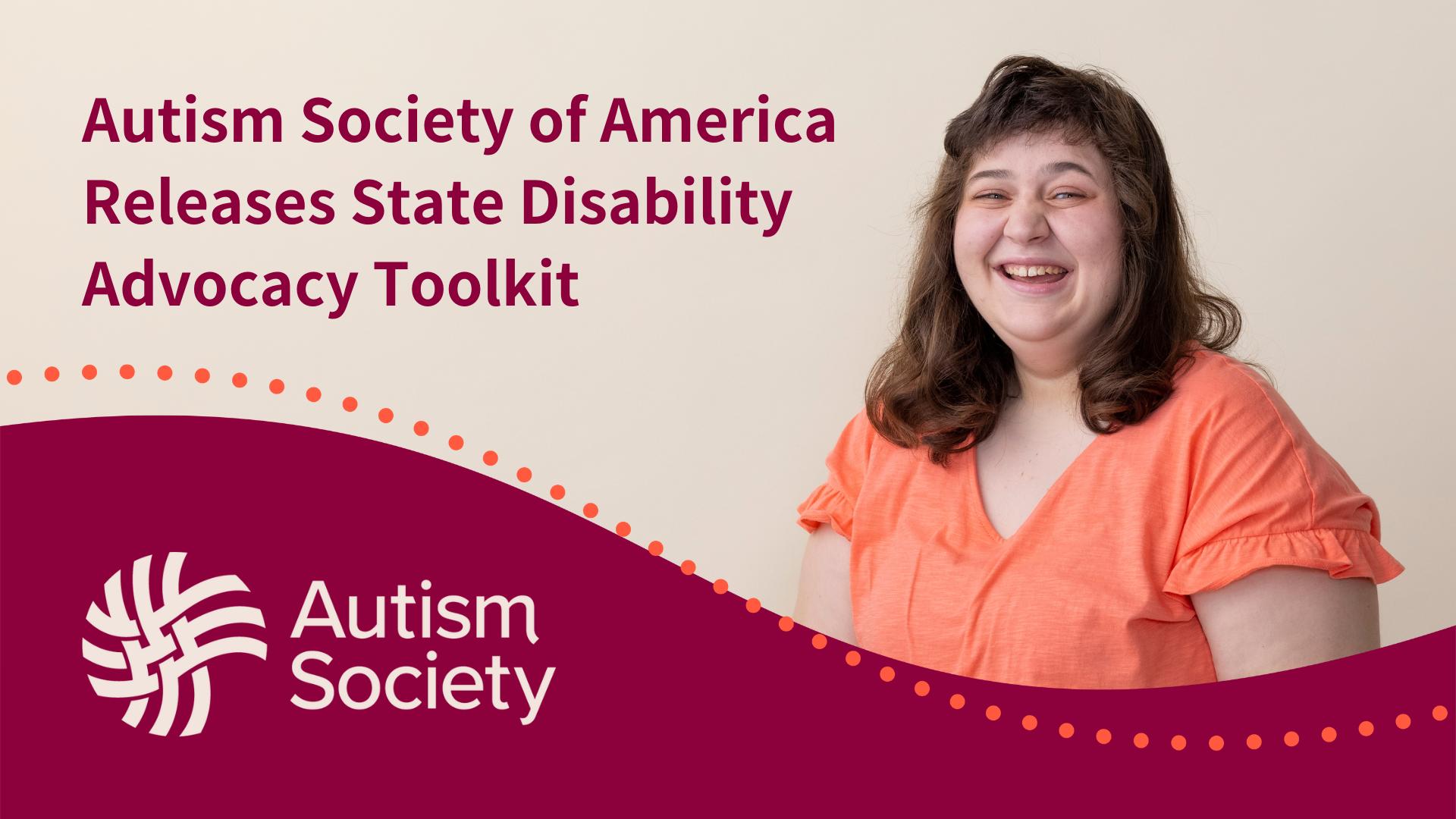
In this issue of Capitol Connection, see an analysis of the reconciliation package that recently passed Congress. In addition, find updates on new legislation and administrative action. We encourage you to visit the Autism Society’s Action Center to connect with your Members of Congress on key issues.
Reconciliation Bill
The reconciliation bill passed the Senate on July 1, 2025, with a vote of 51-50 and Vice President Vance having to break the tie. The Senate made multiple changes to the House version of the package, including more extensive cuts to Medicaid. Senators Tillis (NC), Collins (ME), and Paul (KY) were the three Republicans to vote no. Due to changes in the text, the package had to return to the House, where it ultimately passed the at a vote of 218-214 with Representative Massie (KY) and Fitzpatrick (PA) being the only Republicans who voted no. See the Autism Society’s statement on the bill’s passage here.
Cuts and changes to Medicaid total 1 trillion dollars over the next ten years and will severely restrict state budgets, which can result in many changes to the program for our community. Most impactful provisions include a restriction on provider taxes, work requirements, state directed payments, and a rescission of regulations. The Autism Society was also tracking the inclusion of a new 1:1 tax credit for individuals who donate to state-sponsored scholarship voucher programs for private schools. The Senate made changes to this provision that will lessen its impact. In addition, the permanent extension of three ABLE Account programs was also included in the final law. Find helpful guides and resources below to understand the new law further. The Autism Society will continue to prepare resources and guidance to help families and individuals advocate and navigate the anticipated changes in care, coverage, and services.
- Summary from the Arc to learn more and review effective dates.
- Table of state-by-state impact of bill
- Budget Reconciliation Act Implementation Dates For Select Medicaid & Health Provisions (high level – focused on implementation dates)
- Budget Reconciliation Act Implementation Dates, Funding, and Authorities for Medicaid & Select Health Provisions (more detailed – includes dates, implementation funding, and CMS/HHS roles in administering certain provisions)
———————-
Plain Language
The Senate passed a big bill called the reconciliation bill. The vote was very close, 51 to 50, and Vice President Vance had to break the tie. The Senate made changes to the original version of the bill that came from the House. These changes included bigger cuts to Medicaid. Three Republican Senators—Tillis (NC), Collins (ME), and Paul (KY)—voted no.
Because the Senate changed the bill, it had to go back to the House of Representatives. The House passed the final version with a narrow vote of 218 to 214. Two Republicans, Representatives Massie (KY) and Fitzpatrick (PA), voted no.
The bill includes over $1 trillion in cuts and changes to Medicaid over the next 10 years. This will make it harder for states to pay for Medicaid and may lead to less services for people with disabilities. The Autism Society will make guides to help understand and advocate for Medicaid in the states.
Appropriations
Congress is continuing work on the 12 annual appropriations bills needed to fund the federal government for Fiscal Year 2026. Lawmakers must pass all appropriations bills—or a continuing resolution—by September 30 to avoid a government shutdown.
The Autism Society, alongside our partners, is actively advocating for full funding of essential health, education, and civil rights programs. One of our top concerns is the proposed elimination of the University Centers for Excellence in Developmental Disabilities (UCEDDs) in the Administration’s budget request. The Autism Society has signed multiple coalition letters urging Congress to protect the UCEDD network. We are also closely monitoring threats to programs under the Individuals with Disabilities Education Act (IDEA) Part D—such as Parent Training and Information Centers—and early education grants. These programs are at risk of being block-granted, which would consolidate funding into a single pool for states to allocate, potentially leaving critical line-item programs unfunded.
The Autism Society remains deeply engaged in the appropriations process to ensure that people with Autism and their families have continued access to the services and supports they need.
———————-
Plain Language
Congress is still working on 12 bills that are needed to fund the government for the 2026 budget year. They have until September 30 to pass all of these bills or agree on a short-term plan. If they don’t, the government could shut down.
Some funding could be at risk, including some education and health research programs. We are working with other groups to protect all important funding.
The Autism Society will continue to speak up to make sure people with Autism and their families keep getting the services and support they need.
Legislation Tracker
Multiple pieces of legislation that the Autism Society supports have been introduced and seen some movement since the new Congress started in January.
The Autism Family Caregivers Act was introduced by Representative Min (D-CA), Representative Fitzpatrick (R-PA) and 20 other original cosponsors in the House. This bill would establish a five-year caregiver skills pilot program to award grants to nonprofits, community health centers, or hospitals to provide skills training to family caregivers of children with autism.
The Healthcare Extension and Accessibility for Developmentally Disabled and Underserved Population (HEADs UP Act) was introduced by Representatives Seth Moulton (D-MA), Brian Fitzpatrick (R-PA), Debbie Dingell (D-MI), and Joseph Morelle (D-NY) and would designate the IDD community as a “medically underserved community”, which would help improve access to behavioral, medical and dental care.
The Charlotte Woodward Organ Transplant Discrimination Act was introduced by Representative Cammack (R-FL), Representative Dingell (D-MI), Senator Moody (R-FL), and Senator Hassan (D-NH) and would prohibit discrimination against people with disabilities in the organ transplant system by strengthening protections and ensuring adequate supports and accommodations. This bill passed the House unanimously under suspension of the rules. It has yet to move in the Senate.
The Entrepreneurs with Disabilities Reporting Act was introduced by Representative Stauber (R-MN) and Representative McGarvey (D-KY) and would require the Administrator of the Small Business Administration (SBA) to submit a report to Congress identifying the challenges that small business entrepreneurs and employees with disabilities face. This bill passed the House unanimously under suspension of the rules. It has yet to move in the Senate.
The ThinkDIFFERENTLY About Disability Employment Act was introduced by Representative Stauber (R-MN), Representative Simon (D-CA), Representative Alford (R-MO) and Representative Pappas (D-NH) and would help provide resources and assistance for individuals with disabilities who want to start their own small business or find employment, aid small businesses in hiring people with disabilities, and address accessibility concerns within small business environments. This bill also passed the House unanimously under suspension of the rules. It has yet to move in the Senate.
———————-
Plain Language
A new Congress started in January. Many bills supported by the Autism Society have been introduced and are moving.
- Autism Family Caregivers Act- This bill would create a program to train family caregivers of children with Autism.
- HEADs UP Act- This bill would help people with Autism get better access to all health care.
- Charlotte Woodward Organ Transplant Discrimination Act- This bill would help people with disabilities who need an organ transplant.
- Entrepreneurs with Disabilities Reporting Act- This bill would study issues people with disabilities face in starting or running a small business.
- ThinkDIFFERENTLY About Disability Employment Act- This bill would support people with disabilities in jobs.
Department of Labor Withdraws Rule
The Department of Labor has announced that it will withdraw the proposed rule from the Biden Administration that would have ended the issuance of 14(c) waivers—permits allowing employers to pay subminimum wages to employees with disabilities—and phased out their current use. The Autism Society has long been supportive of phasing out subminimum wages and had written a letter of support for the proposed rule in January. We are disappointed in the withdrawal of this rule and will continue to work with Congress on this issue legislatively.
———————-
Plain Language
The Administration said it will cancel a rule that would have stopped paying people with disabilities less than minimum wage. The rule also would have slowly ended the use of these special permissions, called 14(c) waivers. The Autism Society supports ending less than minimum wage. We are sad that the rule was withdrawn and will keep working with Congress to try to change this through a new law.
Department of Education Funding Withheld
Over 5 billion dollars that were supposed to be distributed to school districts on July 1st are being withheld. This funding was appropriated by Congress through the Continuing Resolution to fund Fiscal Year 2025. The funding includes grants for migrant education, English learners education, student support, summer learning and afterschool programs, and adult education. New America has released analyses on how this has impacted every school district. The Autism Society signed onto a letter with over 600 organizations urging the Secretary of Education to release the funding.
———————-
Plain Language
More than $5 billion that was supposed to go to schools on July 1st is being held back. The money includes education for migrants, English learners, after-school, and summer school. The Autism Society sent a letter with over 600 organizations asking the Secretary of Education to release the funding.
Share:






